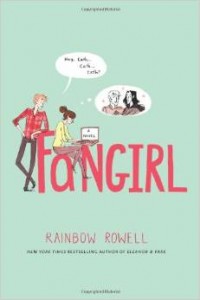Rainbow Rowell’s Fangirl was recommended to me by a mentor who has now recommended several books in a row about young writers coming into their own voice—I think he’s trying to tell me something.
Fangirl was recommended to me by a mentor who has now recommended several books in a row about young writers coming into their own voice—I think he’s trying to tell me something.
Subliminal messages from mentors aside, Fangirl is a quick and fun read, a touching coming-of-age story, and one of the most honest accounts of social anxiety I’ve read. We see the story from the perspective of Cath, a young writer and twin transitioning to college and independence from a complicated home life and emotional reliance on her twin sister Wren. Despite growing tension between Cath and Wren, a newfound interest in boys, and a tumultuous relationship with her roommate, Cath’s most interesting and difficult struggle is to find her own writing voice after years of successfully authoring popular fan-fiction for Simon Snow stories, a parodic take onHarry Potter with a bit of Twilight mixed in.
The plot is fast-paced and engrossing, but perhaps the book’s strongest asset is the narrative voice, told from Cath’s perspective. Cath is clearly a writer, and focuses on the small details of a person’s hairline or a dramatic mannerism and mentally catalogues dozens of ways to describe them. There’s a fantasy here of playing a writer just as much as actually being one, and while it comes off as a slightly juvenile fantasy, that works for a character who is not yet fully comfortable with her writing.
The unreliable narration has shining moments, including fantastic bits of character development, particularly for the things that go unsaid. We can see things our narrator doesn’t tell us, probably because she’s not ready to face them herself. Our narrator doesn’t think she’s unreliable, but her characterizations of some other characters manage to be subtle and charming without slipping into caricature. Other characters do occasionally fall flat, but it’s possible that our young writer sees them not as people but as characters to write later.
Each chapter ends with a Simon Snow excerpt. These are great in small doses to give depth to Cath and to show parallels in the evolution of her relationships and writing. Several chapters, however, contain extended excerpts which get a bit long and feel more like an interruption than an addition.
I wanted to nitpick the writing since so much of the book focuses on craft, from Cath’s mental notes of words to the feedback her writing teacher gives. But the writing, though clearly YA in form and voice, holds up under scrutiny and offers breezy read that I’d recommend to most of my nerd and writer friends.

